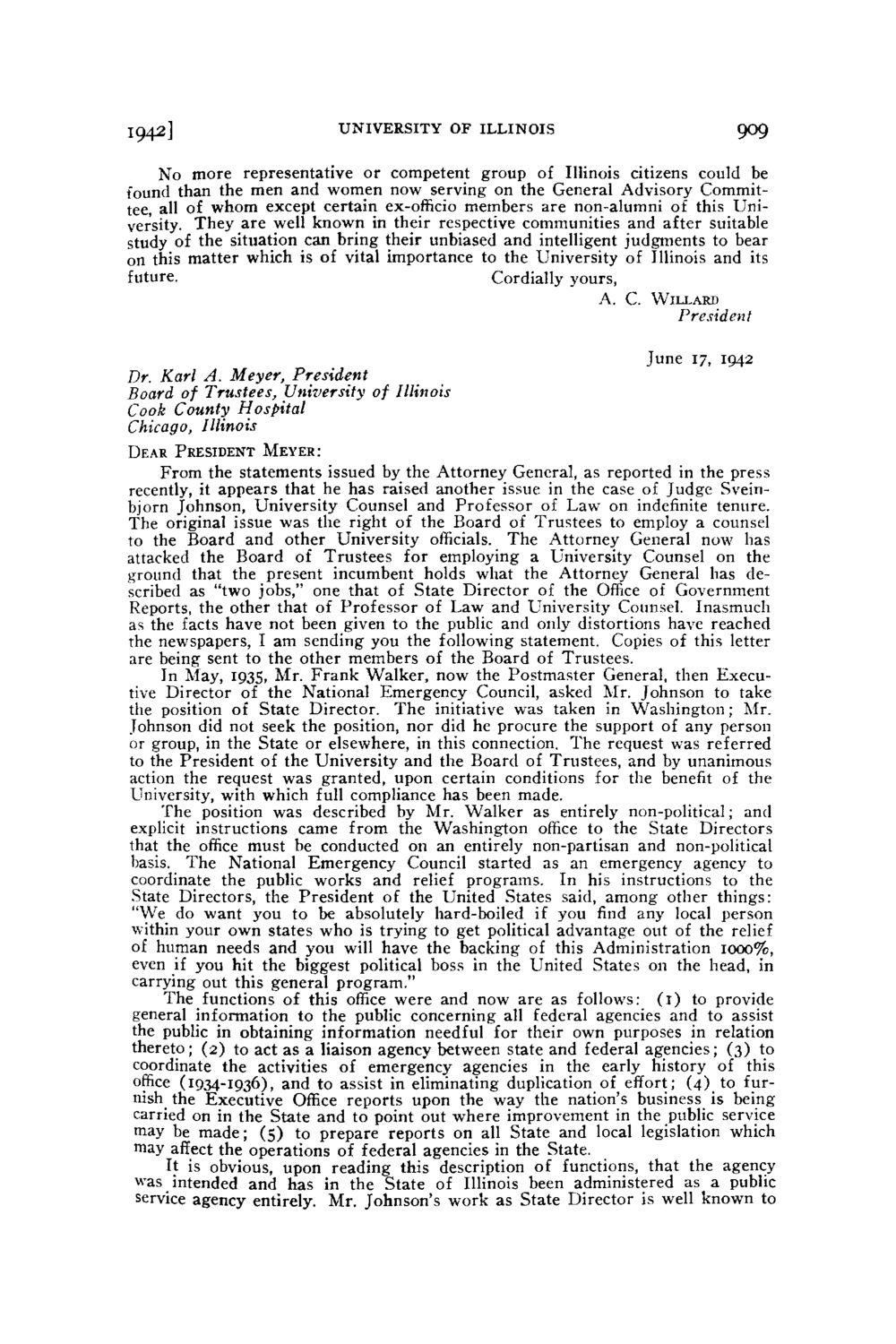| |
| |
Caption: Board of Trustees Minutes - 1942
This is a reduced-resolution page image for fast online browsing.

EXTRACTED TEXT FROM PAGE:
1942] UNIVERSITY OF ILLINOIS 909 No more representative or competent group of Illinois citizens could be found than the men and women now serving on the General Advisory Committee, all of whom except certain ex-officio members are non-alumni of this University. They are well known in their respective communities and after suitable study of the situation can bring their unbiased and intelligent judgments to bear on this matter which is of vital importance to the University of Illinois and its future. Cordially yours, A. C. WILLARD President June 17, 1942 Dr. Karl A. Meyer, President Board of Trustees, University of Cook County Hospital Chicago, Illinois DEAR PRESIDENT M E Y E R : Illinois From the statements issued by the Attorney General, as reported in the press recently, it appears that he has raised another issue in the case of Judge Sveinbjorn Johnson, University Counsel and Professor of Law on indefinite tenure. The original issue was the right of the Board of Trustees to employ a counsel to the Board and other University officials. The Attorney General now has attacked the Board of Trustees for employing a University Counsel on the ground that the present incumbent holds what the Attorney General has described as "two jobs," one that of State Director of the Office of Government Reports, the other that of Professor of Law and University Counsel. Inasmuch as the facts have not been given to the public and only distortions have reached the newspapers, I am sending you the following statement. Copies of this letter are being sent to the other members of the Board of Trustees. In May, 193S, Mr. F r a n k Walker, now the Postmaster General, then Executive Director of the National Emergency Council, asked Mr. Johnson to take the position of State Director. T h e initiative was taken in Washington; Mr. Johnson did not seek the position, nor did he procure the support of any person or group, in the State or elsewhere, in this connection. The request was referred to the President of the University and the Board of Trustees, and by unanimous action the request was granted, upon certain conditions for the benefit of the University, with which full compliance has been made. The position was described by Mr. Walker as entirely non-political; and explicit instructions came from the Washington office to the State Directors that the office must be conducted on an entirely non-partisan and non-political basis. The National Emergency Council started as an emergency agency to coordinate the public works and relief programs. In his instructions to the State Directors, the President of the United States said, among other things: "We do want you to be absolutely hard-boiled if you find any local person within your own states who is trying to get political advantage out of the relief of human needs and you will have the backing of this Administration 1000%, even if you hit the biggest political boss in the United States on the head, in carrying out this general program." The functions of this office were and now are as follows: (1) to provide general information to the public concerning all federal agencies and to assist the public in obtaining information needful for their own purposes in relation thereto; (2) to act as a liaison agency between state and federal agencies; (3) to coordinate the activities of emergency agencies in the early history of this office (1934-1936), and to assist in eliminating duplication of effort; (4) to furnish the Executive Office reports upon the way the nation's business is being carried on in the State and to point out where improvement in the public service may be m a d e ; (5) to prepare reports on all State and local legislation which may affect the operations of federal agencies in the State. It is obvious, upon reading this description of functions, that the agency was intended and has in the State of Illinois been administered as a public service agency entirely. Mr. Johnson's work as State Director is well known to
| |